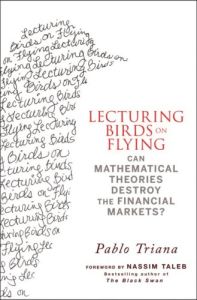Join getAbstract to access the summary!

Join getAbstract to access the summary!
Pablo Triana
Lecturing Birds on Flying
Can Mathematical Theories Destroy the Financial Markets?
Wiley, 2009
What's inside?
In finance, theory has become so divorced from practice that it is no longer relevant.
Recommendation
This is a passionate attack on quantitative financial theory and its influence on business schools and the managers of financial institutions. Financial theorists, Pablo Triana says, are like ornithologists whose birdbrained formulas can’t even come close to approximating the experience of flight. If you have maintained a regular acquaintance with advances in the financial markets, for example, by reading newspapers, you may already be familiar with Triana’s analysis. He relies heavily on the ideas of Nassim Taleb and Emanuel Derman, who explain that people who have experienced improbable events overestimate the chance that such events will recur, while others underestimate it. In this rambling overview, Triana also refers to some of his own previous analyses. He presents a forceful summary of the problems with mathematical economic models. getAbstract finds that he offers good and valuable insights, though not necessarily innovative ones, and recommends his book to investors, financial analysts and thick-skinned economists.
Summary
About the Author
Pablo Triana is a derivatives trader and a frequent contributor to such publications as the Financial Times and Forbes.com. He is the author of Corporate Derivatives.

















Comment on this summary